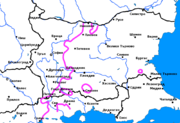
Balkan dialects
Encyclopedia

Bulgarian language
Bulgarian is an Indo-European language, a member of the Slavic linguistic group.Bulgarian, along with the closely related Macedonian language, demonstrates several linguistic characteristics that set it apart from all other Slavic languages such as the elimination of case declension, the...
, covering almost half of the present-day territory of Bulgaria
Bulgaria
Bulgaria , officially the Republic of Bulgaria , is a parliamentary democracy within a unitary constitutional republic in Southeast Europe. The country borders Romania to the north, Serbia and Macedonia to the west, Greece and Turkey to the south, as well as the Black Sea to the east...
and slightly less than a third of the territory on the Balkans
Balkans
The Balkans is a geopolitical and cultural region of southeastern Europe...
where Bulgarian is spoken. Their range includes north-central Bulgaria and most of the Bulgarian part of Thrace
Thrace
Thrace is a historical and geographic area in southeast Europe. As a geographical concept, Thrace designates a region bounded by the Balkan Mountains on the north, Rhodope Mountains and the Aegean Sea on the south, and by the Black Sea and the Sea of Marmara on the east...
, excluding the Rhodopes, the region of Haskovo
Haskovo
Haskovo , is a city, an administrative centre of the homonymous Haskovo Province in southern Bulgaria, not far from the borders with Greece and Turkey. As of February 2011, it has a population of 74,843 inhabitants....
and Strandzha
Strandzha
Strandzha is a mountain massif in southeastern Bulgaria and the European part of Turkey, in the southeastern part of the Balkans between the plains of Thrace to the west, the lowlands near Burgas to the north and the Black Sea to the east. Its highest peak is Mahya Dağı in Turkey, while the...
. As a result of the mass population movements that affected eastern Bulgaria during the 19th and the beginning of the 20th century, the Balkan dialects are now spoken also in vast areas of northeastern Bulgaria, especially the regions of Dobrich
Dobrich
Dobrich is a town in northeastern Bulgaria, the administrative centre of Dobrich Province. With 91,030 inhabitants, as of February 2011, Dobrich is the ninth most populated town in Bulgaria, being the centre of the historical region of Southern Dobruja...
and Varna
Varna
Varna is the largest city and seaside resort on the Bulgarian Black Sea Coast and third-largest in Bulgaria after Sofia and Plovdiv, with a population of 334,870 inhabitants according to Census 2011...
. The most significant feature of the dialects, as in most Eastern Bulgarian dialects, is the pronunciation of Old Church Slavonic (yat) as ʲa or ɛ, depending on the character of the following syllable. The Balkan dialects, and in particular, the Central Balkan dialect
Central Balkan dialect
The Central Balkan dialect is a Bulgarian dialect, which is part of the Balkan group of the Eastern Bulgarian dialects. Its range includes most of north-central Bulgaria , as well as the regions of Karlovo, Kazanlak and Plovdiv in southern Bulgaria, all the way down to the northernmost ridges of...
, lie at the foundation of formal Bulgarian
Bulgarian language
Bulgarian is an Indo-European language, a member of the Slavic linguistic group.Bulgarian, along with the closely related Macedonian language, demonstrates several linguistic characteristics that set it apart from all other Slavic languages such as the elimination of case declension, the...
. However, they are not identical to the standard language because many of its features derive from the Western Bulgarian dialects, including the Macedonian dialects, or are a compromise between Eastern and Western standard.
Phonological and morphological characteristics
- Pronunciation of Old Church Slavonic (yat) as я/е (ʲa/ɛ) – бял/бели (as in Standard Bulgarian)
- щ/жд (ʃt/ʒd) for Proto-Slavic *tʲ/*dʲ (as in Standard Bulgarian) - нощ, между (night, between)
- ъ (ə) for Old Church Slavonic (yus) and ъ (ə) (as in Standard Bulgarian) - мъж, сън (man, sleep)

- Strong reduction of unstressed broad vowels /a/, /ɛ/ and /ɔ/, which are usually transformed into ə, /i/ and /u/. In contrast, Standard Bulgarian allows only moderate reduction of /a/ and /ɔ/ and does not allow any reduction /ɛ/, i.e. the formal norm is a compromise between Eastern and Western Bulgarian (Macedonian)
- Full mutation of a into e after a soft (palatal) consonant and ж /ʒ/, ш /ʃ/, ч /t͡ʃ/ and дж /d͡ʒ/, before a soft syllable: жаба-жеби (frog-frogs), чаша-чеши (cup-cups), пиян-пиени (drunk sing. - drunk pl.). This is not accepted in Standard Bulgarian, which has instead adopted Western Bulgarian жаба-жаби, чаша-чаши, пиян-пияни
For the phonological and morphological characteristics of the individual dialects included in the Balkan dialects, cf. individual articles.

